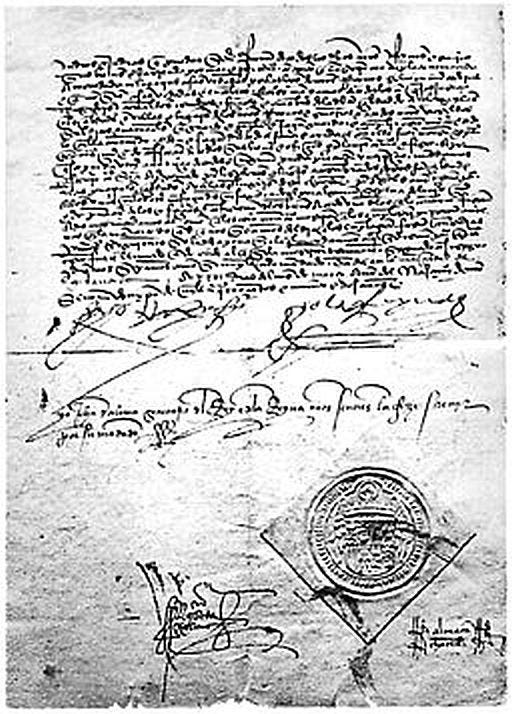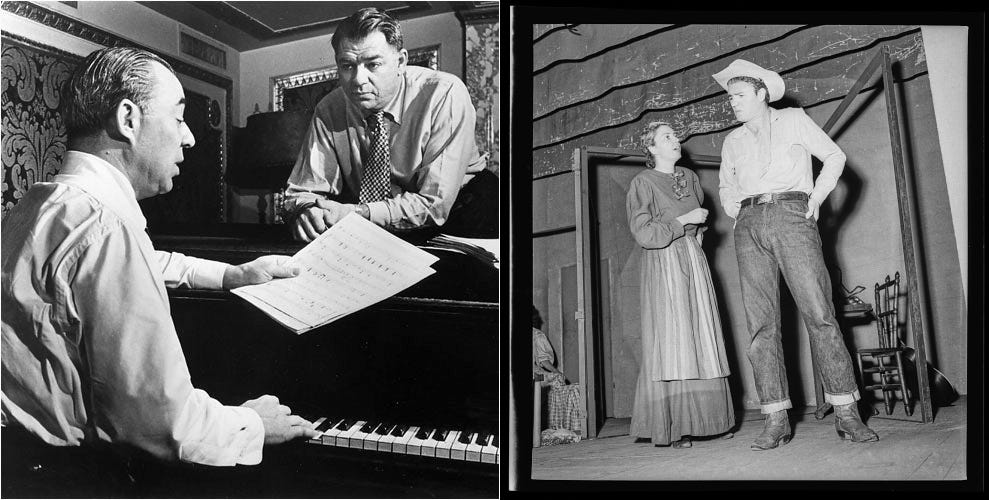The Mysteries of History (March 31 Edition)
Antisemitism in Spain; Oklahoma!; Warsaw Pact Disintegrates
1492 — Spain Expels Jews
public domain image from wikimedia commons
Ferdinand and Isabella, best remembered for financing the errant navigator C. Columbus when he “sailed the ocean blue,” on this date in that same year of 1492 decreed that all Jews in Spain must leave the country.
Their reason? Ferdy and Izzy had ramped up the Inquisition. Acting as early-day Nazis, they considered Jewish people to be undesirables, brutally enforcing laws that had been passed against them, harassing them, and finally ordering them out of the country altogether, viewing them as heretics.
Thus, in that same year of 1492, Spain tried to force Catholicism on people in two different ways: 1) By giving the Jews in the Country an ultimatum of either converting or leaving, the latter option causing them to sell their land and houses at cut-rate prices, and 2) By imposing Catholic teachings on the subjugated peoples they colonized in the Americas while simultaneously displaying their immoral, greedy, and fierce nature —a fine example, indeed, of how Christians should act (Not!).
Questions: How strong a force in geopolitics was Spain in its heyday? Where does it rank today? Where and when did it go wrong? What happened to the vaunted Spanish Armada in 1588 when it sailed to England to conquer that Country? What happened in South America in the early 1800s? What was the result of the Spanish-American War at the end of the 1800s? Does it appear to you that Spain had God’s backing and blessing?
1943 — Oklahoma! Exceeds Expectations
public domain images from wikimedia commons
“Oklahoma!” opened on Broadway on this date in 1943; twelve years later, in 1955, the film version was released.
Perhaps obviously, the play had been successful. That’s an understatement, in fact, as it was performed 2,212 times before it finally closed five years later. The play was first called “Away We Go” (based on an earlier play, Green Grow the Lilacs), and some reviews were less than enthusiastic. One gent summed it up this way: “No girls. No legs. No chance.”
Everyone’s a critic.
But Oklahoma! (as it was renamed by the time it hit Broadway) was nobody’s underdog. It was not derivative; it did not follow the usual formula. For instance, instead of starting with a bang, and being all about the singing and dancing, the music supported the story, and was oftentimes subtle, such as in the opening scene, when Curly waxes melodic about corn and the Oklahoma landscape.
The audience proved the critics dead wrong: they loved it. Among those responsible for its popularity/success (besides the original cast) were the songwriting team of Rodgers and Hammerstein and choreographer Agnes DeMille.
It’s interesting to note that the play is set in Claremore (hometown of Will Rogers) in 1906, when “Oklahoma” was still Indian Territory (it didn’t became the State of Oklahoma until the following year). It should be noted, though, that in 1889 a section of Oklahoma had been opened to white settlement, and by 1905 most of the people living in the area were white, having displaced much of the native residents.
Questions: How many of the original cast members had to be replaced before the play ended? Do you think you would be bored playing the same role night after night for five years, or would you be glad the play was that popular and happy to have a presumably well-paying job? Did any of the original cast members reprise their roles in the 1955 movie version? Did any of the subsequent cast members reprise their roles in the 1955 movie version?
1991 — Warsaw Pact Disintegrates
public domain image from wikimedia commons
The Warsaw Pact (something like the eastern/communist version of NATO) fell apart on this date in 1991. The Soviet Union was the “old grey nag” that “wasn’t what she used to was” anymore.
The original signatories to the alliance were the Countries of Albania, Bulgaria, Czechoslovakia, East Germany, Hungary, Poland, Romania, and (last alphabetically not not least) the Soviet Union.
The bond began to loosen in the late 1980s. First East Germany quit the club, then Czechoslovakia and Poland lost their zeal for it, also. Eventually the Soviets let go of their control of the Warsaw Pact forces and finally formally declared the scheme to be kaputt.
Questions: How smooth was the reunification of East and West Germany? How much friction was involved when Czechoslovakia and Poland sent the Soviet Union a “Dear Ivan” letter? How did the citizens of those Countries feel about their changed circumstances? In what ways were the common people affected? With the recent expansion of NATO, what are the chances of a similar alliance emerging once again, with Russia at the center of it?
Read about “The Secret Lives of Kids” here.









